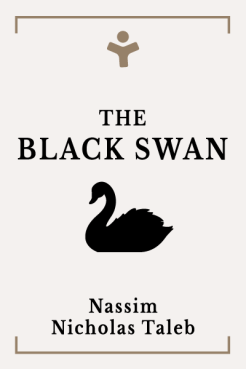
The Black Swan: The Impact of the Highly Improbable
by Nassim Nicholas TalebIn The Black Swan, Nassim Nicholas Taleb explores the concept of highly improbable events that have a massive impact on our world, known as "black swans." He argues that humans are hardwired to focus on specifics and fail to consider what they don't know, leading to a misunderstanding of the world around us. By reading this book, you'll be able to change the way you view the world for the better.
Mitigating Errors in Your Judgment
To mitigate errors in judgment, it's crucial to acknowledge the limitations of our understanding of past and present events and the fallibility of our future predictions. Luckily, the widespread use of camera cell phones has made it easier for travelers to capture and share images of "black swans" - those rare and unexpected events that can have a massive impact.
The "black swan" usually results from collective and individual errors in judgment, usually due to overconfidence in one's knowledge; it is not an objective phenomenon.
Rather than solely focusing on improving our predictions, it's more important to build resilience to errors. While people often view their knowledge as something to safeguard, it's easier to manage "black swan" problems if we prioritize resilience.
People often view their knowledge as something to be protected and defended. It is more important to be resilient to errors than to improve predictions. It is much easier to deal with the black swan problem if one focuses on being resilient to errors rather than improving predictions.
Since we live in an environment where information is always changing, "black swan" epidemics can spread quickly. To manage these events successfully, we need to pay attention to our surroundings, not get too attached to our knowledge, and approach things with a skeptical empiricist mindset.
Actions to take
Preparing for Unexpected Events
Nassim Nicholas Taleb's concept of an empirical skeptic encourages people to be prepared for unexpected events and to recognize the complexity of the world we live in.
One important thing to remember is that history doesn't always move in a straight line, and we should always be prepared for sudden changes. We can create a society that values coexistence and tolerance by respecting and understanding cultural and religious differences.
Actions to take
Being Aware of the Black Swan Problem
The "black swan" problem refers to unexpected events that have a significant impact. It stems from the problem of induction, which involves drawing general conclusions from specific instances to reach general conclusions.
Examples of the Black Swan problem include historical events such as the Great War of 1914 and the stock market crash of 1987. These incidents demonstrate that past experiences are not always reliable predictors of the future.
To prevent and mitigate the risks associated with "black swan" events, it's important to learn proper risk management.
Actions to take
Avoiding the Confirmation Bias
Confirmation bias is a mental error that can lead to incorrect conclusions. This phenomenon, also known as "naive empiricism," occurs when individuals seek out evidence that confirms their pre-existing beliefs while ignoring evidence that disproves them.
To avoid this, we don't necessarily have to be a complete skeptic. Rather, we should adopt the idea of "one-sided semi-skepticism," where we approach things with a bit of skepticism but not to the point where we reject everything outright.
Actions to take
Finding Silent Evidence
We should be aware of the potential for silent evidence to lead us to incorrect conclusions. Silent evidence is a type of systematic error that hides the randomness of an event. This bias can manifest in various ways, such as attributing success solely to certain ideas or religions, overlooking evidence in court, and having misguided beliefs about historical logic.
The tricky thing is that this silent evidence isn't always obvious and can cause us to either overestimate or underestimate the truth. To avoid falling prey to this bias, we need first to understand what silent evidence is and then actively try to avoid it.
Actions to take
Exercising Caution When Making Predictions
Exercising caution is important when making predictions, especially in economics where certain data and models are used. Because these data and models have limitations, your predictions will not always be accurate.
Similarly, in order to make sound decisions, we must avoid being overconfident in our knowledge and overestimating our future, which is referred to as "epistemic arrogance." It is important to delay forming opinions until one has enough evidence and to question the confidence of experts, as the future may not always follow the course initially envisioned.
Actions to take
Choosing Knowledgeable and Experienced Leaders
The concept of "epistemocracy" envisions a utopian society in which individuals in positions of power are elected based on their expertise and knowledge. This theory is rooted in the belief that knowledge is power and should be used to inform decision-making.
In such a society, it is important to have knowledgeable leaders who can unite people. The advantages of being part of a community far outweigh the drawbacks of being isolated. Thus, the need for competent and capable leaders to guide and govern people toward a more prosperous future is essential.
Actions to take
Maximizing Risks
As human beings, we tend to gravitate toward certainty, but if we want to accomplish great things, we need to be willing to take risks and acknowledge the role of luck in our success.
It's also important to realize that life is full of surprises, both good and bad. That's why we should prepare ourselves for all possible outcomes and accept that failure is just a natural part of the journey.
Finally, when it comes to making decisions, we should aim to minimize risks and prevent unnecessary losses. That doesn't mean we should avoid taking risks altogether, but rather that we should use strategies that reduce volatility while still allowing for the possibility of substantial gains.
Actions to take
Don’t just read. Act.


